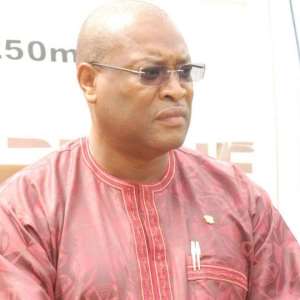
By Christabel Addo, GNA
Accra, Sept. 24, GNA - Mr Alexander Segbefia, the Minister of Health, has called on African countries to prioritise the strengthening of their national health systems in order to achieve meaningful, effective and sustainable emergency preparedness.
He said there was no doubt that weak and fragile health systems, coupled with inadequate resources hinder adequate response to emergencies in the region, and addressing the challenge would require leadership, ownership and alignment of partner agencies to support country priorities.
He said it would also ensure the implementation of a collective, coherent and synergistic approach among international, regional and national stakeholders in responding to emergencies to produce desirable results.
Mr Segbefia said it further requires countries to commit domestic resources for the implementation of International Health Regulation (IHR) 2005, while partners mobilise additional resources to supplement the countries' effort.
The Health Minister made the call in a speech read on his behalf on the occasion of the certification for Training of 105 ECOWAS Regional Response Rapid Team (ERRRT) in Accra on Friday.
The training which was initiated by the West Africa Health Organisation (WAHO) was aimed at strengthening the capacity of the Sub-region to effectively respond to public health emergencies.
Mr Segbefia said 'we now appreciate better that global health security is all about strong and resilient health systems. The most vulnerable countries are those with the least developed systems, many of these are in our sub-region'.
He said the whole region was at risk of emerging infectious diseases and with Sub-region having its fair share of devastating health emergencies including the serious outbreaks of Yellow fever, SARS, Zika, and the recent Ebola Viral Disease, critical lessons must be embedded into its preparedness effort for ongoing and future health threats.
Unfortunately, majority of these infectious disease threats occur in the context of poor socio-economic status, weak health systems, rapid population growth, unplanned urbanisation, climate change, natural hazards such as floods and drought, armed conflicts and other social unrests, he said.
These underlying factors, he said, exacerbates the vulnerabilities of the human and health systems and justifies the call for a holistic, multi-sector and all-hazard approach to emergency preparedness in the region.
He said investing in preparedness for health emergencies reduces socio-economic disruptions and protects the country's economic achievements, however, inadequate preparedness and response capabilities, insufficient financial, human and logistical resources, fragmented health services, limited community engagement, inadequate inter-country collaborations and partnerships continue to present major challenges to attaining health security in the African Region and Global Health Security.
'We need stronger national public health capabilities, infrastructure, and processes built to a common standard and regularly assessed through an objective and transparent process that was fully consistent with the International Health Regulations (IHR) 2005.
He urged the members of the ERRRT to operate in harmony to ensure the security of their respective countries, the sub-region, the continent and Global Health Security at large.
Dr Xavier Crespin, the Director General of WAHO, thanked ECOWAS, the African Union and its other development partners for their support and solidarity towards the building of strong and resilient health systems in the sub- region.
Mrs Melinda Tabler-Stone, the Deputy Chief of Mission at the US Embassy in Ghana, said the ECOWAS Rapid Responders would advance health security not only in West Africa, but also on a global scale, and called for commitment by countries and collaboration from all sectors in the integration of efforts.
Mr Edouard Singnatey, the Vice-President of ECOWAS, urged the ERRRT to quickly anticipate the effect of such problems which contribute to breeds of such huge problems in order to avert them.
Dr Ibrahim Soce Fall, the WHO Representative, also cautioned the ERRRT members to be mindful of culture and traditions of the people and communities they work within in order to maintain peace and security.
Dr Benjamin Djoudalbaye, who represented the African Union, warned countries against the possibility of being complacent about the gains they have made so far, but to work hard to reduce the epidemic burden by further strengthening their health systems and sustaining emergency preparedness.
GNA




 We’ll protect state wealth from opaque deals – Prof Jane Naana
We’ll protect state wealth from opaque deals – Prof Jane Naana
 Mauritania president says running for second term in June polls
Mauritania president says running for second term in June polls
 I won't ever say I was a mere driver’s mate' — Prof. Opoku-Agyemang
I won't ever say I was a mere driver’s mate' — Prof. Opoku-Agyemang
 2024 polls: 'EC struggling to defend credibility'— Prof. Opoku-Agyemang
2024 polls: 'EC struggling to defend credibility'— Prof. Opoku-Agyemang
 Akufo-Addo gov't's 'greed, unbridled arrogance, unrestrained impunity, sheer dis...
Akufo-Addo gov't's 'greed, unbridled arrogance, unrestrained impunity, sheer dis...
 Election 2024: Ghana needs an urgent reset, a leadership that is inspiring – Ma...
Election 2024: Ghana needs an urgent reset, a leadership that is inspiring – Ma...
 Partner NDC to rollout a future of limitless prospects – Prof Jane Naana Opoku-A...
Partner NDC to rollout a future of limitless prospects – Prof Jane Naana Opoku-A...
 NPP will remain in gov’t till Jesus comes — Diana Asamoah
NPP will remain in gov’t till Jesus comes — Diana Asamoah
 Sunyani Technical University demands apology from former SRC president over sex-...
Sunyani Technical University demands apology from former SRC president over sex-...
 'Dumsor' was resolved by Mahama but ‘incompetent' Akufo-Addo has destroyed the g...
'Dumsor' was resolved by Mahama but ‘incompetent' Akufo-Addo has destroyed the g...
